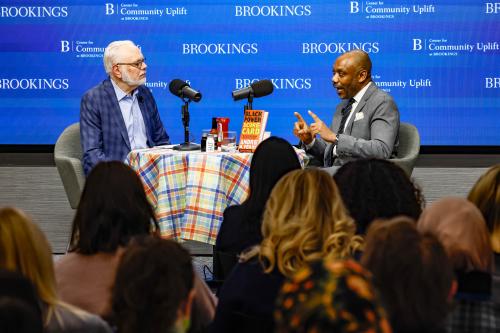On December 4 and 5, South Africa hosted Chinese President Xi Jinping in Johannesburg for the Forum on China-Africa Cooperation (FOCAC). Notably, going above and beyond its tradition of doubling financing commitment to Africa at each FOCAC meeting, China tripled it this time. While these major commitments on different fronts are welcomed by African leaders, watchers of China-Africa relations are asking more questions, especially about the downturn of Sino-Africa economic relations this year and the implications of these renewed pledges in the context of China’s own economic slowdown.
This year’s pledges from China to Africa differ from past ones
Xi’s single largest commitment at the summit is a pledge of investment totaling $60 billion. As noted above, the size of these pledges is surprising, as China had consistently doubled its financing pledges toward Africa at previous FOCAC meetings from $5 billion in 2006, to $10 billion in 2009, and to $20 billion in 2012. Similarly, it is worth noting that unlike the previous pledges, which all had a three-year timeframe, China’s promise this time does not come with one. Nevertheless, since the next FOCAC meeting is expected to be in 2018, China is likely to fulfill most of its commitment before announcing new ones.
Differences with past commitments also lie in the composition of the financial pledges. In 2006, China specified that the $5 billion consisted of $3 billion concessional loans and $2 billion of buyer’s credit. In 2009, the $10 billion was in its entirety concessional loans. In 2012, China’s contribution shifted to $20 billion loans. And this time, the $60 billion are defined more broadly as “investment,” including $5 billion for grants and zero-interest loans, $35 billion for concessional loans and buyer’s credit, and the rest as commercial financing. The diversified portfolio sends several messages: 1) China is more confident in the economic future of the African continent; 2) China is becoming more aggressive in its financial input in Africa; and 3) the assets owned by China on the ground in Africa are likely to grow.
China highlights new sectors for cooperation and downplays African natural resources
At the summit, Xi proposed 10 overarching plans for Sino-Africa cooperation, covering almost all aspects of their economic ties: industry, agriculture, infrastructure, environment, trade facilitation, poverty alleviation, and public health. The overall direction fits in the readjustment of China’s Africa policy since the inauguration of President Xi. “Industrial capacity cooperation” (产能合作) and “strategic complementarity” (战略对接) have become the two keywords for China’s economic aspiration in Africa. Under China’s own economic restructuring and Africa’s aspiration for industrialization, modernization, and urbanization, China is keen on shifting its labor-intensive industries to Africa. Such industrial capacity cooperation is to be complemented by the export of China’s excess capacity to support African infrastructure projects and capacity building through technical assistance, vocational training, and fellowship programs.
Rather strikingly, natural resources have almost completely disappeared from China’s policy statements this time. Xi only mentioned natural resources once in his long speech—and only in reference to Africa’s abundant economic endowment and promising future. Similarly, in the much longer elaboration on how China plans to implement these new economic and trade measures, the Chinese vice minister of commerce opted to focus on how to develop and expand Africa’s non-resources exports. Neither official made any reference to China’s investment and cooperation with Africa on resources sectors.
This scarcity of references is not in line with the overall important role natural resources have played in China’s imports from Africa. As of November 2015, the majority of African exports to China remains in natural resources. According to the statistics by Chinese customs, crude oil, iron ore, diamonds, and agricultural products together accounted for 56.5 percent of Chinese imports from Africa during the first three quarters of 2015. And this number is on the low end because China’s demand for raw materials has been suppressed by its economic slowdown this year. In this sense, China’s intention of downplaying the importance of natural resources in Sino-Africa trade in its policy manifestation is clear. Given the negative image associated with the large role played by African natural resources in Sino-Africa economic relations, such an aspiration is understandable.
Under shifting Sino-African relations, what do these pledges really mean?
Industrialization, diversification of trade, infrastructure development, and regional economic integration are all the right ingredients for Africa’s sound economic future. However, in the near term, in light of China’s own economic slowdown, questions do exist about the implications of China’s economic ties with Africa and the sustainability of China’s financial pledges.
First of all, a circle needs to be squared between China’s grand pledges and the recent downturn of Sino-Africa economic relations. This downturn has manifested itself not only through the decrease of Sino-Africa trade but also China’s plummeting investment toward the continent. According to the data from the Chinese Ministry of Commerce, trade has dropped 18 percent in the first nine months of 2015 from a year earlier, the largest decline in China’s trade with Africa in recent years. On the investment side, Ministry of Commerce just revealed last month that China’s direct investment in Africa stood at $1.19 billion in the first half of 2014, falling over 40 percent year on year. The downturn is attributed to the sluggish global economic recovery, international commodity fluctuations, and the Ebola outbreaks.
Whether the drop in both trade and investment only represents a short-term fluctuation or a long-term trend remains to be seen. The Chinese vice minister of commerce is said to be “confident about China-Africa trade” because of positive developments in Africa, including its growing population, hence its labor force and market potential. However, it is widely recognized that China’s own economic slowdown has suppressed its domestic demand for raw materials, which explains the large 39.3 percent drop of China’s imports from Africa from this past January to September. The new initiatives announced by Xi, if implemented well, have the potential to improve the picture in the long run. However, in the near term, the shape of Sino-Africa economic relations will largely depend on China’s own economic recovery, which still has some major uncertainties to say the least.
Second, the old question about the payment terms of Chinese loans remains. The majority of Chinese financing in Africa is not free grants, but loans and investments. In the past, many of the loan agreements had been backed by Africa’s natural resources, as shown by the famous Angola model. Currently, as noted above, China is trying to downplay the role of natural resources in Sino-Africa relations and to evolve toward new models of economic cooperation. However, despite the sound logic, a key question emerges: If the Chinese loans are no longer backed or repaid with African resources, what are they backed and paid with?
There is no consensus on the answer even among Chinese analysts. Some seem to be confident that the GDP growth and tax revenue to be generated through the infrastructure projects, industrialization, and trade facilitation in Africa will gradually lead to a healthy cycle of payment for Chinese loans. Nevertheless, many more are skeptical and see that scenario as a long game and overly optimistic. Particularly given the scale of the Chinese financing, it will be extremely difficult for China to completely abandon resources in its financing schemes. Interestingly, some others have raised certain creative options focused on ownership of assets on the ground, including land.
The commercial viability of these economic agreements is of high importance for China’s domestic politics. If unsuccessful, they have the potential to generate further criticism of the Chinese government, raising questions about Xi’s governance and competence. Indeed, an article widely circulated on Chinese social media earlier this month called for President Xi to stop his expensive foreign visits because he sends billions of dollars to foreign countries every single time while China’s domestic problems (poverty, environment, housing price, medical care, and education) exacerbate. In this sense, although Xi did make major financial pledges to Africa, unless the deals prove to be truly mutually beneficial, the domestic political and economic costs of such contributions will become an increasingly serious challenge for China from within.
In spite of China’s economic slowdown and the drop in commodity prices, Africa remains the second fastest growing region behind Asia and some countries like Mozambique, Ethiopia, and the Democratic Republic of the Congo are among the fastest growing in the world. The Chinese $60 billion deal is a calculated but bold bet, but from the perspective of African countries it is timely and supportive. From the Chinese perspective, the bet might be risky for a variety of reasons but it will for sure tie China’s future closer to that of Africa.
The Brookings Institution is committed to quality, independence, and impact.
We are supported by a diverse array of funders. In line with our values and policies, each Brookings publication represents the sole views of its author(s).



Commentary
Xi and the 6th Forum on China-Africa Cooperation: Major commitments, but with questions
December 7, 2015